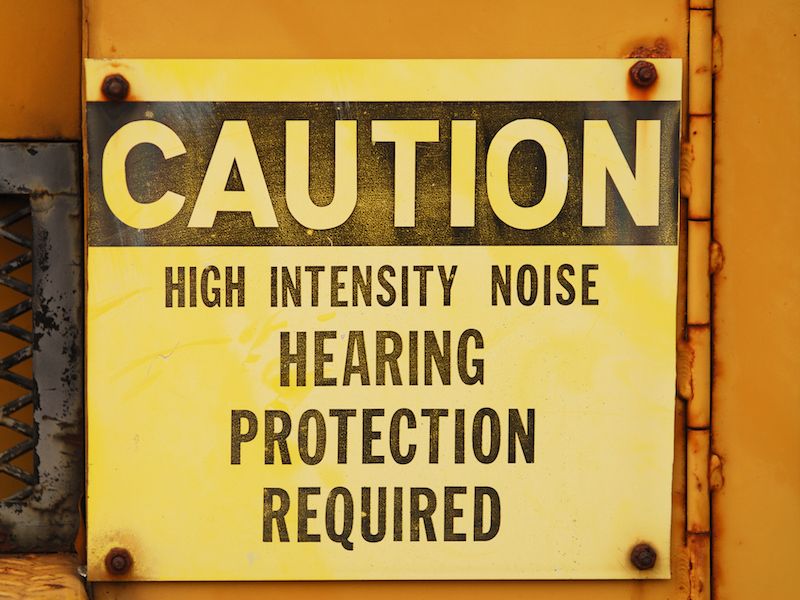
Understanding you should safeguard your ears is one thing. It’s another matter to know when to safeguard your hearing. It’s not as simple as, for example, determining when to use sunblock. (Are you going outside? Is the sun out? You need to be wearing sunscreen.) It’s not even as easy as determining when to wear eye protection (Handling hazardous chemicals? Doing some construction? You need eye protection).
When it comes to when to wear hearing protection, there seems to be a large grey area which can be dangerous. Unless we have particular information that some activity or place is hazardous we tend to take the easy path which is to avoid the problem entirely.
Determining The Risks
In general, we’re not very good at assessing risk, especially when it comes to something as intangible as long term hearing damage or loss of hearing. Here are some examples to prove the point:
- Person A attends a very loud rock concert. 3 hours is about the length of the concert.
- Person B owns a landscaping company. After mowing lawns all day, she goes home and quietly reads a book.
- Person C works in an office.
You may believe the hearing danger is greater for person A (let’s just call her Ann). For most of the next day, her ears will still be screeching from the loud performance. Presuming Ann’s activity was dangerous to her ears would be sensible.
Person B (let’s call her Betty), on the other hand, is exposed to less noise. There’s no ringing in her ears. So it has to be safer for her hearing, right? Not necessarily. Because Betty is pushing that mower every day. Actually, the damage accumulates a little at a time although they don’t ring out. Even moderate noise, if experienced with enough frequency, can injury your hearing.
What’s going on with person C (let’s call her Chris) is even more difficult to sort out. Most people realize that you should safeguard your hearing while using equipment like a lawnmower. But while Chris works in a quiet office, she has a very noisy, hour-long commute every day through the city. Additionally, she sits at her desk and listens to music through earbuds. Is protection something she should consider?
When is it Time to be Concerned About Protecting Your Ears?
The standard rule of thumb is that if you have to raise your voice to be heard, your environment is noisy enough to do damage to your ears. And you need to think about using earplugs or earmuffs if your environment is that noisy.
If you want to think about this a little more clinically, you need to use 85dB as your cutoff. Noises above 85dB have the potential, over time, to lead to injury, so you need to give consideration to using ear protection in those situations.
Your ears don’t have a built-in sound level meter to warn you when you get to that 85dB level, so countless hearing professionals suggest downloading specialized apps for your phone. These apps can show you when the ambient sound is approaching a dangerous level, and you can take proper steps.
A Few Examples
Even if you do get that app and take it with you, your phone may not be with you everywhere you go. So we might formulate a good standard with a couple of examples of when to protect our hearing. Here we go:
- Exercise: Your morning spin class is a good example. Or maybe your nighttime Pilates session? All of these examples might call for hearing protection. Those instructors who use sound systems and microphones (and loud music) to motivate you may be good for your heart rate, but all that loudness is bad for your hearing.
- Operating Power Tools: You recognize you will want hearing protection if you work all day in a factory. But how about the hobbyist building in his workshop? Most hearing specialists will suggest you use hearing protection when using power tools, even if it’s only on a hobbyist basis.
- Driving & Commuting: Driving all day as an Uber or Lyft driver? Or perhaps you’re just hanging around downtown for work or getting on the train. The noise of living in the city is bad enough for your hearing, not to mention the extra injury caused by turning up your music to drown out the city noise.
- Household Chores: Even mowing the lawn, as previously explained, requires hearing protection. Chores, like mowing, are probably something you don’t even think about, but they can lead to hearing damage.
- Listening to music with earbuds. This one requires caution, not protection. Whether your music is playing directly into your ears, how loud it is playing, and how long you’re listening to it are all things you should give consideration to. Think about getting headphones that cancel out outside sound so you don’t need to turn up the volume to dangerous levels.
A good baseline may be researched by these examples. If there is any doubt, though, use protection. In most cases, it’s better to over-protect your ears than to leave them exposed to possible harm in the future. Protect today, hear tomorrow.